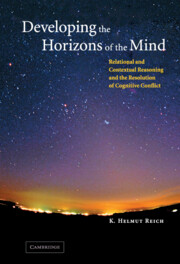 Developing the Horizons of the Mind
Developing the Horizons of the Mind Book contents
- Frontmatter
- Contents
- List of figures
- List of tables
- Acknowledgements
- Introduction
- Part I The Theory of Relational and Contextual Reasoning (RCR) and its Empirical Study
- 1 Introduction
- 2 Development of RCR
- 3 Metaphysical Assumptions and Theory of RCR
- 4 Empirical Studies of RCR
- 5 Other Thought Forms and Matching Them to the Problem at Hand
- Part II Applications of RCR
- Appendix 1 Interviewing techniques
- Appendix 2 Scoring manual for RCR
- References
- Index
5 - Other Thought Forms and Matching Them to the Problem at Hand
Published online by Cambridge University Press: 22 September 2009
- Frontmatter
- Contents
- List of figures
- List of tables
- Acknowledgements
- Introduction
- Part I The Theory of Relational and Contextual Reasoning (RCR) and its Empirical Study
- 1 Introduction
- 2 Development of RCR
- 3 Metaphysical Assumptions and Theory of RCR
- 4 Empirical Studies of RCR
- 5 Other Thought Forms and Matching Them to the Problem at Hand
- Part II Applications of RCR
- Appendix 1 Interviewing techniques
- Appendix 2 Scoring manual for RCR
- References
- Index
Summary
In chapter 1 (pp. 16–19) RCR was hypothesised to share elementary, conjunctive, or even composite operations with other forms of thought. In chapter 3 (pp. 41–3) arguments were provided that Piagetian operations, dialectical thinking, analogical thinking, and cognitively complex thought were relevant other thought forms. This was broadly supported empirically (chapter 4). It is therefore justified to compare and contrast them with RCR and with each other. A second reason is that they are sufficiently different from each other and RCR to serve for a demonstration of the thesis that for best results the thought form employed must be matched to the problem structure. That will constitute the second section of this chapter.
Other thought forms relevant to RCR
Piagetian logico-mathematical thinking
Rather than covering Piagetian logico-mathematical thinking in its entirety (cf. Fondation Archives Jean Piaget 1989), after a short recap I concentrate on its critical aspect in regard to RCR: the logic involved.
Some core characteristics of thinking according to Piaget (1970) were already indicated in previous chapters. At the formal operational stage, the overall challenge of Piagetian tasks consists in formulating hypotheses, testing them, and coming to a conclusion. Specific objectives are (a) to find out which are the ‘true’ (active) variables (e.g., task ‘combination of coloured and colourless chemical bodies’); (b) to combine variables (e.g. the ‘snail’ task – see Fig. 4.1, p.), or (c) to elucidate natural laws (e.g., tasks ‘floating bodies’, ‘balance scale’).
Information
- Type
- Chapter
- Information
- Developing the Horizons of the MindRelational and Contextual Reasoning and the Resolution of Cognitive Conflict, pp. 75 - 98Publisher: Cambridge University PressPrint publication year: 2002